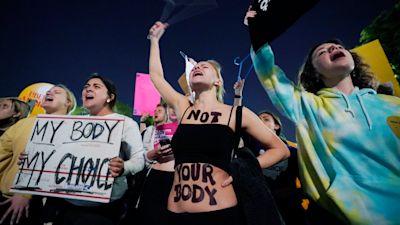Explainer
Could the US be about to ban safe, legal abortions and what is the Roe vs Wade case?

According to a leaked document from the Supreme Court, a nearly 50-year protection for the right to have a legal abortion in the US could be coming to an end.
Abortion rights are a contentious issue across the country, with many states making no secret of their opposition and already setting up laws to take effect if the court rules in their favour.
It all comes down to what nine judges make of a 1973 ruling that's now the subject of a new proposed law in Mississippi.
Here's what it means and what could happen.
What is Roe vs Wade?
The Roe vs Wade ruling established a nationwide right to safe and legal abortion at any point before a foetus can survive outside the womb, generally around 24 weeks.
It was based on the decision that a woman's right to end her pregnancy came under the freedom of personal choice in family matters.
At the centre of the case was Norma McCorvey, whose legal challenge under the pseudonym “Jane Roe” led to the US Supreme Court’s landmark ruling.
She was 22, unmarried, unemployed and pregnant for the third time in 1969 when she sought to have an abortion in Texas, where the procedure was illegal except to save a woman’s life.
The subsequent lawsuit led to the Supreme Court’s 1973 ruling that established abortion rights, though states could still restrict abortion to varying degrees.
Ms McCorvey later became an opponent to abortion.
With the Supreme Court considering a proposed law to ban abortions in Mississippi, justices now have a chance to overturn the Roe ruling.
What happens if it is overturned?
If the 1973 decision is overruled, the power to decide on the legality of abortions and all the relevant details would be transferred in full back to each individual state.
In effect, this would make safe and legal abortions out of reach for millions of women across the country as Republican-dominated states move to ban the procedure.
It would not, however, end people getting abortions - critics say it would just end safe and legal routes of doing so and give rise to dangerous practices instead.
Some states still have unenforced laws predating 1973 that could come back to life immediately once the ruling is reversed. Others have so-called trigger laws that could be quickly enforced.
How many states would ban abortion if free to do so?
Around 26 states – little more than half of the entire country – are certain or likely to ban abortion if Roe vs Wade is overturned, according to the pro-abortion rights think tank the Guttmacher Institute.
Of those, 22 states already have total or near-total bans on the books that are currently blocked by Roe, aside from Texas.
The state's law banning it after six weeks has already been allowed to go into effect by the Supreme Court due to its unusual civil enforcement structure.
Four more states are considered likely to quickly pass bans.
Eight Democratic-leaning states protected or expanded access to abortions, including California, which has passed legislation making getting a pregnancy terminated less expensive and is considering other bills to make itself an “abortion sanctuary” if Roe is overturned.
So, how likely is it this will happen?
The draft opinion strongly suggests that when the justices met in private shortly after arguments in the case on December 1, at least five out of the nine justices voted to overrule.
But ultimately the document is a draft opinion – which means just that.
The document is a version circulated in February, which means votes may have changed since then. Wording can also change.
Nothing is for sure, although the draft opinion has raised fears that were already elevated in December.
Why is this leak such a big deal?
While there have, on very rare occasions, been leaks of the outcomes in cases, the publication of an apparent draft running nearly 100 pages is virtually unprecedented in modern times.
Leaks have been made in the past – for example, even the outcome of Roe vs Wade was made public hours before any announcement in 1973.
What you need to know - Listen to the latest episode
Neal Katyal, who has argued dozens of cases before the court and as a young lawyer worked for Justice Stephen Breyer, said on Twitter: “I’m pretty sure there has never ever been such a leak.
“And certainly not in the years I’ve been following the Supreme Court.”
Much of the court’s secrecy is owed to strict rules around disclosure. Clerks who work with the justices sign an oath promising not to divulge secrets.
There is only a small group of people who would be in a position to see a draft opinion and then leak it, so suspicions will likely be significantly raised within the court.
Isn’t there are already a crackdown on abortion?
This year, anticipating a decision overturning or gutting Roe, eight conservative states have already moved to restrict abortion rights.
Oklahoma, for example, passed several bills in recent weeks, including one that goes into effect this summer making it a crime to perform an abortion in the state.
Like many anti-abortion bills passed in Republican-led states this year, it does not have exceptions for rape or incest – only to save the life of the mother.
Should the Roe ruling stand, these bills would likely be slapped down.
Meanwhile, the new Texas law that bans most abortions and was designed to evade court challenges has been in effect nearly eight months, resulting in a major spike in abortions in Oklahoma as women in Texas head to surrounding states to receive services.